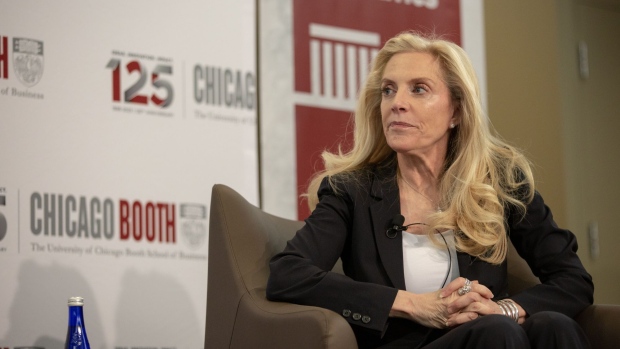Feb 14, 2023
Brainard’s Exit Spurs Speculation on Fed Vice Chair Replacement
, Bloomberg News

(Bloomberg) -- Federal Reserve Vice Chair Lael Brainard’s pending departure to the White House has spurred speculation over who would replace the influential dove as policymakers weigh how much further to raise interest rates.
President Joe Biden, who named Brainard as the new head of the National Economic Council on Tuesday, may be nowhere near deciding whom to nominate at the central bank, a post requiring Senate confirmation. But Fed watchers wasted no time in coming up with some names of their own after Brainard’s name surfaced last month as a contender for the key administration job.
The Fed in a statement said Brainard submitted her resignation Tuesday, and that it will be effective on or around Feb. 20.
“She has superb credentials as an economist and has experience in the political arena,” Kathy Bostjancic, chief economist at Nationwide Mutual Insurance Co., said Tuesday. “The Federal Reserve needs to find someone who is very experienced and competent to fill the important role of vice chair that she vacates.”
Monetary Policy Analytics, a research firm chaired by former Fed Governor Larry Meyer, said in a recent note that one potential candidate could be Karen Dynan, a Harvard University professor who was the top economist in the Obama Treasury Department and spent 17 years at the Fed before that.
Other names circulating among Fed watchers and people close to the administration include Janice Eberly, a Northwestern University finance professor who also served as chief economist in the Obama Treasury, and Brian Sack, the one-time head of the New York Fed’s Markets Group who recently left his job at D.E. Shaw & Co.
“The difficulty for the administration will be finding someone who is as well-respected within the Fed as Vice Chair Brainard,” said Stephen Stanley, chief US economist at Santander US Capital Markets LLC. “It may be tough for her replacement to step in and command as much sway as she had.”
Brainard’s policy views have made her one of the most dovish of the Fed’s 19 policymakers. While she supported its aggressive rate hikes last year to curb high inflation, she’s more recently warned of the risks of overtightening amid signs the economy is slowing and price pressures are starting to abate.
Finding her replacement could affect the balance of hawks and doves on the Fed’s policy-setting committee, as officials try to achieve a soft landing for the economy that gets inflation under control without causing unnecessary harm to American workers.
Brainard’s departure may “skew the committee somewhat more hawkish, but it depends on who they replace her with and how long it takes,” Bostjancic said.
‘Dominant Factor’
“That all said, the economic data, namely inflation, is the dominant factor driving Fed policy – even the doves recognize that,” she added.
Still, Brainard played an important role sketching out the views of the Fed’s more dovish officials, and her departure will change the tone of the message markets are receiving from the central bank, said Evercore ISI’s Peter Williams.
“Even if the replacement is a perfect match, it will take time for him/her to gain similar influence in the policy process,” Williams said in a note to clients Tuesday.
The Fed No. 2 often also acts as a surrogate for the chair in reinforcing the policy message. The job in recent years has been filled by influential macroeconomists, including former Fed chair and current Treasury Secretary Janet Yellen, Richard Clarida, Stanley Fischer and Brainard herself.
Brainard’s move would also mean the departure of a woman in a key leadership position at the central bank, which has been criticized in recent years for the dearth of women and minorities in senior roles.
“The Fed has made a lot of strides, but that’s going to have to be part of the consideration as well,” said Julia Coronado, co-founder of Macropolicy Perspectives and a former Fed economist. “All else equal, if you’ve got a roster of good, qualified people, you’re going to want to choose somebody that maintains that diversity or adds to it rather than, you know, turns the clock back.”
--With assistance from Alister Bull.
(Updates to reflect Brainard resignation in)
©2023 Bloomberg L.P.





